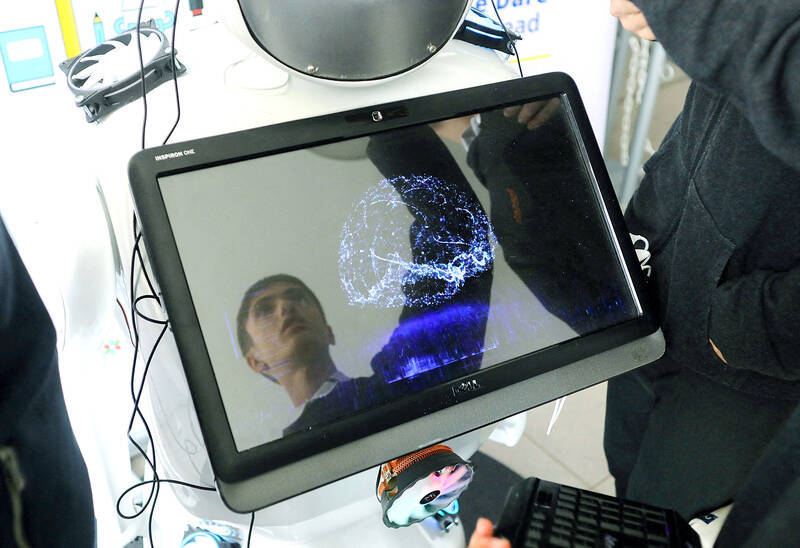Many workers across the US are turning to ChatGPT to help with basic tasks, a Reuters/Ipsos poll found, despite fears that have led employers such as Microsoft and Google to curb its use.
Companies worldwide are considering how to best make use of ChatGPT, a chatbot program that uses generative AI to hold conversations with users and answer myriad prompts. Security firms and companies have raised concerns, however, that it could result in intellectual property and strategy leaks.
Anecdotal examples of people using ChatGPT to help with their day-to-day work include drafting e-mails, summarizing documents and doing preliminary research.

Photo: Reuters
Some 28 percent of respondents to the online poll on artificial intelligence (AI) between July 11 and 17 said they regularly use ChatGPT at work, while only 22 percent said their employers explicitly allowed such external tools.
The Reuters/Ipsos poll of 2,625 adults across the US had a credibility interval, a measure of precision, of about 2 percentage points.
Some 10 percent of those polled said their bosses explicitly banned external AI tools, while about 25 percent did not know if their company permitted use of the technology.

Photo: Reuters
ChatGPT became the fastest-growing app in history after its launch in November. It has created both excitement and alarm, bringing its developer OpenAI into conflict with regulators, particularly in Europe, where the company’s mass data-collecting has drawn criticism from privacy watchdogs.
Human reviewers from other companies may read any of the generated chats, and researchers found that similar artificial intelligence AI could reproduce data it absorbed during training, creating a potential risk for proprietary information.
“People do not understand how the data is used when they use generative AI services,” said Ben King, VP of customer trust at corporate security firm Okta.
“For businesses this is critical, because users don’t have a contract with many AIs — because they are a free service — so corporates won’t have run the risk through their usual assessment process,” King said.
OpenAI declined to comment when asked about the implications of individual employees using ChatGPT, but highlighted a recent company blog post assuring corporate partners that their data would not be used to train the chatbot further, unless they gave explicit permission.
When people use Google’s Bard it collects data such as text, location and other usage information. The company allows users to delete past activity from their accounts and request that content fed into the AI be removed. Alphabet-owned Google declined to comment when asked for further detail.
Microsoft did not immediately respond to a request for comment.
‘HARMLESS TASKS’
A US-based employee of Tinder said workers at the dating app used ChatGPT for “harmless tasks” like writing e-mails even though the company does not officially allow it.
“It’s regular e-mails. Very non-consequential, like making funny calendar invites for team events, farewell e-mails when someone is leaving ... We also use it for general research,” said the employee, who declined to be named because they were not authorized to speak with reporters.
The employee said Tinder has a “no ChatGPT rule” but that employees still use it in a “generic way that doesn’t reveal anything about us being at Tinder.”
Reuters was not able independently confirm how employees at Tinder were using ChatGPT. Tinder said it provided “regular guidance to employees on best security and data practices.”
In May, Samsung Electronics banned staff globally from using ChatGPT and similar AI tools after discovering an employee had uploaded sensitive code to the platform.
“We are reviewing measures to create a secure environment for generative AI usage that enhances employees’ productivity and efficiency,” Samsung said in a statement on Aug. 3.
“However, until these measures are ready, we are temporarily restricting the use of generative AI through company devices.”
Reuters reported in June that Alphabet had cautioned employees about how they use chatbots including Google’s Bard, at the same time as it markets the program globally.
Google said although Bard can make undesired code suggestions, it helps programmers. It also said it aimed to be transparent about the limitations of its technology.
BLANKET BANS
Some companies said they are embracing ChatGPT and similar platforms, while keeping security in mind.
“We’ve started testing and learning about how AI can enhance operational effectiveness,” said a Coca-Cola spokesperson in Atlanta, Georgia, adding that data stays within its firewall.
“Internally, we recently launched our enterprise version of Coca-Cola ChatGPT for productivity,” the spokesperson said, adding that Coca-Cola plans to use AI to improve the effectiveness and productivity of its teams.
Tate & Lyle Chief Financial Officer Dawn Allen, meanwhile, said that the global ingredients maker was trialing ChatGPT, having “found a way to use it in a safe way.”
“We’ve got different teams deciding how they want to use it through a series of experiments. Should we use it in investor relations? Should we use it in knowledge management? How can we use it to carry out tasks more efficiently?”
Some employees say they cannot access the platform on their company computers at all.
“It’s completely banned on the office network, like it doesn’t work,” said a Procter & Gamble employee, who wished to remain anonymous because they were not authorized to speak to the press.
P&G declined to comment. Reuters was not able independently to confirm whether employees at P&G were unable to use ChatGPT.
Paul Lewis, chief information security officer at cyber security firm Nominet, said firms were right to be wary.
“Everybody gets the benefit of that increased capability, but the information isn’t completely secure and it can be engineered out,” he said, citing “malicious prompts” that can be used to get AI chatbots to disclose information.
“A blanket ban isn’t warranted yet, but we need to tread carefully,” Lewis said.

In recent weeks the Trump Administration has been demanding that Taiwan transfer half of its chip manufacturing to the US. In an interview with NewsNation, US Secretary of Commerce Howard Lutnick said that the US would need 50 percent of domestic chip production to protect Taiwan. He stated, discussing Taiwan’s chip production: “My argument to them was, well, if you have 95 percent, how am I gonna get it to protect you? You’re going to put it on a plane? You’re going to put it on a boat?” The stench of the Trump Administration’s mafia-style notions of “protection” was strong

Every now and then, it’s nice to just point somewhere on a map and head out with no plan. In Taiwan, where convenience reigns, food options are plentiful and people are generally friendly and helpful, this type of trip is that much easier to pull off. One day last November, a spur-of-the-moment day hike in the hills of Chiayi County turned into a surprisingly memorable experience that impressed on me once again how fortunate we all are to call this island home. The scenery I walked through that day — a mix of forest and farms reaching up into the clouds

With one week left until election day, the drama is high in the race for the Chinese Nationalist Party (KMT) chair. The race is still potentially wide open between the three frontrunners. The most accurate poll is done by Apollo Survey & Research Co (艾普羅民調公司), which was conducted a week and a half ago with two-thirds of the respondents party members, who are the only ones eligible to vote. For details on the candidates, check the Oct. 4 edition of this column, “A look at the KMT chair candidates” on page 12. The popular frontrunner was 56-year-old Cheng Li-wun (鄭麗文)

“How China Threatens to Force Taiwan Into a Total Blackout” screamed a Wall Street Journal (WSJ) headline last week, yet another of the endless clickbait examples of the energy threat via blockade that doesn’t exist. Since the headline is recycled, I will recycle the rebuttal: once industrial power demand collapses (there’s a blockade so trade is gone, remember?) “a handful of shops and factories could run for months on coal and renewables, as Ko Yun-ling (柯昀伶) and Chao Chia-wei (趙家緯) pointed out in a piece at Taiwan Insight earlier this year.” Sadly, the existence of these facts will not stop the